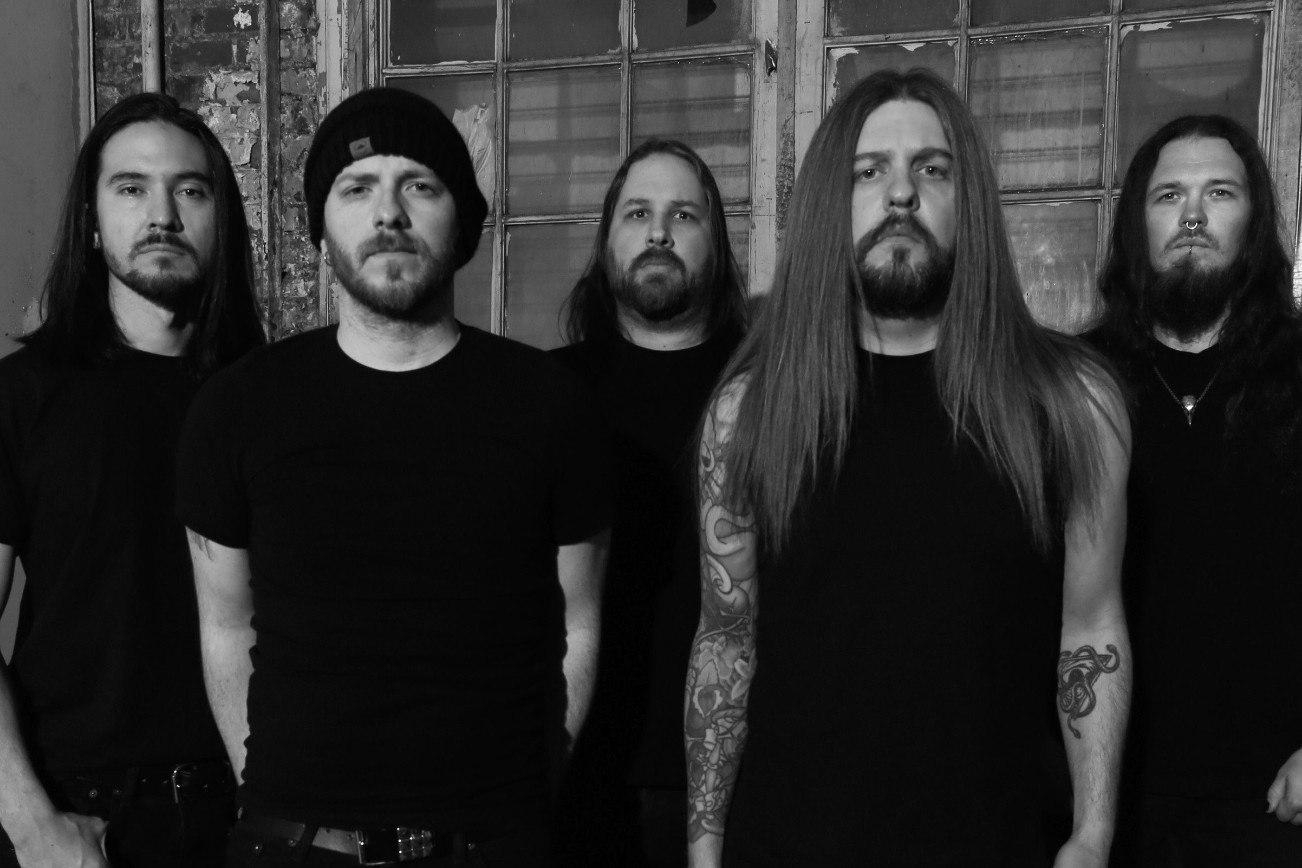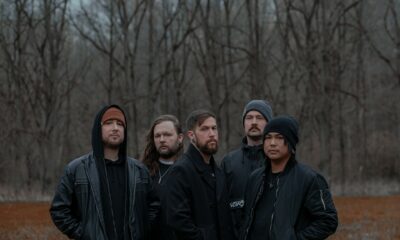Interviews
WAR CURSE Guitarist JUSTIN ROTH Offers a Comprehensive Look into the Band’s Past, Present and Future, Plus the New Album ‘Eradication’
Featuring members of bands such as Heathen, Exhorder and Division, guitarist Justin Roth gives us a comprehensive look into War Curse’s past, present and future and their new Svart Records album Eradication.

There are a number of star-studded guest appearances on Eradication, the second album by Ohio thrashers, War Curse. Fortunately, the album of classy and classic Bay Area thrash stands on its own and doesn’t wane under the weight of outside help. That’s not to say that having Heathen/Exhorder bassist Jason Viebrooks in the band’s lineup and a drummer with Division, Pharaoh, Marzi and Randy Ellefson credits to his name doesn’t help the group gain traction in an over saturated scene.
Eradication (buy now via iTunes) hearkens back to the days when thrash metal was maturing into its own skin, back when label vultures came a’ calling looking for the next Metallica and discovering that there was only one of them, but there was Testament, Megadeth, Defiance, Forbidden, Exodus and Heathen. Guitarist Justin Roth gives us a comprehensive look into War Curse’s past, present and hopeful future.
What can you tell us about the band’s history?
Justin Roth: Like a lot of bands, our formation was one of chance and dumb luck. I was finishing college at the time and working as a designer at a screen printing shop with very little to do most days. So, to entertain myself I’d scan the internet looking for records or old band shirts or whatever. In the process of doing so, I came across a Craigslist post made by (drummer) James Goetz. He was living in Washington D.C. at the time and looking for dudes to jam with when he moved back to Ohio. I responded out of sheer boredom and we talked on and off about influences and random nonsense for a while.
Months had gone by and I had all but forgotten about the conversation when he hit me back up looking to jam. To avoid an awkward one-on-one hangout with a stranger I invited (guitarist) Joshua Murphy to come down and jam with us. Murphy and I have been in bands together for the last fifteen or so years, so we have our process of writing and jamming together pretty well sorted. James came down, I dusted off some old riffs I had recorded on my cell phone over the last few years and we hit it off famously. That was the tail end of 2013.
Fast forward a little bit; we had most of the songs written that would later become our first release, Final Days and decided to recruit some people to complete the lineup. After a revolving door of horrendous auditions, Dawn Patrol was born. But wait, someone is already using that name and our first show is booked. I guess we’ll call the band War Curse. Sounds better anyway, right? So, War Curse became a real band sometime late 2014.
Kragen Lum makes a guest appearance on War Curse’s recently released music video for “Serpent.”
Was thrash the first and only choice for War Curse’s intentions? Would you say there was a defining moment that moved the band from hobby/casual jamming stages to more directed and serious status?
Roth: I’d say yes and no. Most of the influences we discussed were golden-era thrash bands, Megadeth being one we talked about a lot. We knew we wanted to play something in the realm of traditional heavy/thrash metal, but our musical tastes are all over the board. When writing the first album we’d just throw things against the wall and see what stuck. A few journalists who reviewed Final Days (read our review here) listened well enough to pick up on some of the more obscure ingredients that got thrown into the pot, so to speak. I still pull a lot of inspiration from non-thrash bands. Stuff like Dokken, Rainbow, Nazareth, even some old hardcore bands like Strife and Earth Crisis make their way into my brain when I’m sitting down to write.
On to the second half of your question, I’d say that the turning point in our musical endeavor was landing a tour with Solstice (U.S.). We had been playing shows and making a name for ourselves around the mid-west, but we were still weekend warriors with no plans to do much more than have fun and play occasionally. Once the demand grew and people started putting the idea in our heads that we were on to something bigger, my mentality started to shift.
Murphy and I had been down this road together many times before, (we) started bands that caught on, put out albums, toured only to watch things fall apart or fall short of their potential. But despite my reluctance to go through the painstaking process of chasing that dream again, we decided to go for it. Of course, that decision is never without casualties. The decision to pursue full-time band status and to tour more frequently cost us some members, including our original vocalist, but we licked our wounds, built a better, more focused band with new members and here we are.
War Curse’s latest album Eradication was just released yesterday, through Svart Records.

How does the band internally balance the extensive experience with groups at higher levels that Jason and James both possess in comparison to the relative inexperience of the other members? Do you find there’s a deference to that experience, whether conscious or not? Or is it a non-issue amongst you guys and you’re happy with the way things are and hearing the crazy stories Jason and James have?
Roth: Jamming with Jason for the first time was scary as hell. Heathen is one of my all-time favorite thrash bands and knowing the level of musicians that he’s used to working with had me pissing myself to pick up a guitar. I mean who in the hell are Justin Roth and Josh Murphy when your other band consists of Kragen Lum and Lee Altus? So that was fun.
That stuff aside, having Jason around has been invaluable. I’ve traveled around the globe with Jason, as Exhorder’s tour manager, learning from him and watching how true professionals operate. Yeah, he’s a killer bassist, and yeah, he knows a few people, but his impact goes way beyond music. He has become one of my best friends and someone I consider to be a mentor. I don’t think there’s much of a difference in experience between the rest of us. (Vocalist) Blaine (Gordon) has been in bands for years, Murphy and I have been around the block a few times and James is a drummer. We make it work.
How long did it take to write Eradication? Is there a story surrounding its creation?
Roth: We hadn’t even finished recording Final Days before we started working on songs that ended up on Eradication. One thing that I can’t stand is downtime, so we’re always writing or working on something behind the scenes. We’ve already started writing the next one, actually. So, it’s an ongoing thing. I’m a pretty firm believer that hard work pays off and I’ll work myself to death when I believe in a project. Thankfully, I’ve got a group of guys around me that share a similar work ethic. As far as motivations go, I was never really happy with Final Days and I knew we were capable of more. We had songs piling up and we had the time, so why not make an album? That’s what bands are supposed to do, right?
“Sands of Fate” is track two on Eradication and one of the album’s standouts.
Was there anything that was done differently in terms of the way the album was written or recorded than what you had done in the past? Or goals you wanted to attain with and on this album that you might have missed out on with Final Days?
Roth: So many things. Like anything else in life you try to learn from your mistakes. We spent a hell of a lot more time making this album and took a more methodical approach to doing things in the studio. Some of the songs on Eradication were re-written a half dozen times before I’d sign off on them. We used a total of four studios to make this album, making sure we had the best engineers on the job. We couldn’t have been any luckier in getting Scott Atkins (Grindstone Studio UK) to mix and master the album.
Every detail mattered this time. We banged out Final Days in like three to four days. In all fairness to that album, it was meant to be our demo. We never expected a label to want to put it out or anyone outside of Cincinnati to hear it, so we cut a few corners and didn’t sweat the details like we should have. We’re thankful that people responded to it the way they did, but Eradication feels like the starting line to me. This is the album that I want to be known for at this moment in time and I think it’s a very accurate representation of War Curse as a band.
What is the story behind the album’s title?
Roth: Every song on Eradication is about a humanitarian or global crisis of some sort. I wouldn’t exactly call it a concept album, but in a way, it felt like we were writing one. When it came to the title track of the album, the message is something that I can’t help but feel passionate about. I’m not a tree hugging member of Greenpeace or anything, not even close, but the way we treat each other, the way we treat the environment and the way we treat animals is disgusting. Eradication is correlation of those thoughts. We can and should do better and if not, I hope we’re wiped off the face of the earth.
How would you characterize Eradication compared to your previous record?
Roth: I think we’ve touched on it a lot, but it’s just a different animal. The songs are better written, the performances are better, the band itself is better. It’s just an all-around better album from start to finish. Not that I don’t love some of those older songs. I can’t imagine ever removing “Severed Crosses” from the live set. But listen to the albums back-to-back and you’ll see for yourself. We’re not fucking off in the basement anymore.
Itching for more thrash? Stream the entirety of Eradication here:
How did you come to the attention of Svart Records, a label that doesn’t generally look beyond its borders when signing bands?
Roth: After the release of Final Days, Kyle Stevens, owner of our previous label Static Tension, passed away unexpectedly. At the time we were being managed by Rob Wrong, guitarist of The Skull and Witch Mountain, a great friend of mine. Witch Mountain happens to be on Svart Records.
So, from the very early stages of making Eradication they had shown interest in our band. We had conversations with a lot of different labels, including some of the big household names, but ultimately we were offered the best deal and quite honestly, received the best treatment from Tomi and the people at Svart. We couldn’t be happier with the decision to sign with them for this album.
Tell us about the numerous guest spots, how they came to be, how those contributions were executed, etc.?
Roth: One of the first things a lot of people notice are the familiar names on this album. Kragen Lum of Heathen/Exodus (live), Glen Alvelais, formerly of Forbidden/Testament, and Kyle Thomas, vocalist of Exhorder/Trouble. Some pretty serious dudes to have on the same album. We knew we had some room to toy around with things on a couple of the songs and Jason suggested having someone lay down a guest solo. He reached out to a few of his bandmates and friends and we had a few bites.
So, we scratched some of the parts we planned to record ourselves and made room for the three of them to do their thing. Each one of them had total creative freedom to do whatever they wanted, and like the veterans that they are, they all delivered incredible performances. To this day, I get goosebumps when I hear Kyle’s vocals at the end of “Deadly Silence.” He’s one of the most talented vocalists I’ve ever had the pleasure to work with, tour with and watch perform. All three guys are class acts and we can’t thank them enough for being a part of Eradication.
A fantastic look into War Curse live; check out “Severed Crosses” here:
What do you feel that War Curse offers that’s different to: 1. the metal/thrash scene in general and, 2. from other bands/projects you’ve previously been/presently are involved with?
Roth: Part 1: I think this is something that the fans and critics ultimately get to decide. But from my perspective, amongst younger bands, we are probably the closest thing to a classic Bay Area sounding thrash band at the moment. There are a lot of great young bands out there, some of which are doing incredibly well, but none of them sound like us. We aren’t screaming or playing as fast as humanly possible for the sake of outdoing the next guy. We focus first and foremost on songwriting and doing what’s best for that particular composition.
One of our biggest strengths and something that we identified early on is our ability to cross genre lines and appeal to everyone from casual fans to diehards, young and old alike. We are a thrash metal band, sure, but we don’t turn anyone off. We have played shows with rock bands and won their crowds over and we’ve done the same in a room full of extreme metal fans. But again, it doesn’t matter what I think. The fans and the people reading this will make that call.
Part 2: Comparing this band to former projects or Jason’s 37 million successful bands is like comparing apples to cat food and caviar. We aren’t any of those bands and the only thing we have in common are members. Murphy and I have played in so many bands together, punk bands, hardcore bands, weird bands that sound like Hot Water Music and Sunny Day Real Estate fucked and gave birth to a kid with a lazy eye, you name it. We’re just musicians playing the stuff that we love to play.
What’s the plan once the album is fully released?
Roth: The first thing we’re going to do is buy mansions and marry supermodels. After that, we’ve got a headlining U.S. tour kicking off in May with a young thrash band from Michigan called Tyrant. The plan for the rest of 2019 is to tour as often as possible and to continue working our asses off. There are some things in the works that I can’t discuss yet. We’re definitely looking forward to making our way to Europe, which is also in the works. More than anything we’re ready to get out, play shows, and grow our network of friends and fans as far and wide as we can take this thing.
-

 Music5 days ago
Music5 days agoTake That (w/ Olly Murs) Kick Off Four-Night Leeds Stint with Hit-Laden Spectacular [Photos]
-

 Alternative/Rock6 days ago
Alternative/Rock6 days agoThe V13 Fix #010 w/ High on Fire, NOFX, My Dying Bride and more
-

 Hardcore/Punk2 weeks ago
Hardcore/Punk2 weeks agoHastings Beat Punks Kid Kapichi Vent Their Frustrations at Leeds Beckett University [Photos]
-

 Alternative/Rock2 weeks ago
Alternative/Rock2 weeks agoA Rejuvenated Dream State are ‘Still Dreaming’ as They Bounce Into Manchester YES [Photos]
-

 Features5 days ago
Features5 days agoTour Diary: Gen & The Degenerates Party Their Way Across America
-

 Culture1 week ago
Culture1 week agoDan Carter & George Miller Chat Foodinati Live, Heavy Metal Charities and Pre-Gig Meals
-

 Music7 days ago
Music7 days agoReclusive Producer Stumbleine Premieres Beat-Driven New Single “Cinderhaze”
-

 Alternative/Rock1 week ago
Alternative/Rock1 week agoThree Lefts and a Right Premiere Their Guitar-Driven Single “Lovulator”














